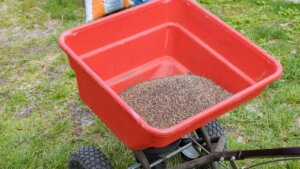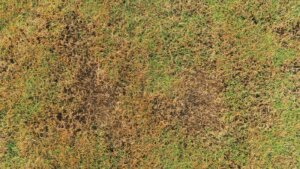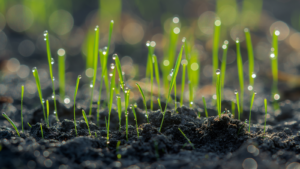In Collegeville, PA, where green grass symbolizes a well-maintained home, selecting the correct type of fertilizer is crucial for achieving that picture-perfect lawn. With a myriad of options, from organic lawn foods to quick-release fertilizers, homeowners are often at a crossroads.
What constitutes the best fertilizer for grass? How do you foster a greener lawn, encourage healthy lawn growth, and cater to new grass with the ideal lawn food? Lawn fertilization is an art and a science, and this guide aims to demystify the process, helping you transform your lawn into a lush, organic lawn.
Understanding Different Types of Lawn Fertilizers
Different lawns have different needs, influenced by soil type, grass variety, and local climate. In Collegeville, PA, where diverse grass types flourish, selecting the appropriate fertilizer is crucial.
- Organic vs Synthetic Fertilizers. Organic fertilizers, derived from natural sources, slowly release nutrients, enriching the soil. Synthetic fertilizers offer a quicker, more targeted nutrient boost.
- Liquid vs Granular. Liquid fertilizers are easy to apply and act fast, ideal for quick green-ups. Granular types release nutrients over time, providing long-term nourishment.
- Slow-Release vs Quick-Release. Slow-release fertilizers steadily feed your lawn, reducing the risk of nutrient runoff and grass burn. Quick-release options give an immediate nutrient surge but require more frequent applications.
Key Considerations:
Here are some valuable hints you should consider for achieving and maintaining a green lawn:
- For New Lawns: Starter fertilizers with higher phosphorus content promote robust root growth.
- For Mature Lawns: Nitrogen-rich formulas enhance color and density.
- Seasonal Choices: Tailor your fertilizer choice to the season for optimal lawn health.
Choosing the Right Fertilizer for Your Lawn in Collegeville, PA
Collegeville’s lawns, predominantly featuring cool-season grasses like Kentucky bluegrass and fescue, thrive with proper fertilization. Understanding the unique needs of these grasses, especially in the varying Pennsylvania climate, is vital to a lush, healthy lawn.
Cool-season Grasses in Collegeville
- Kentucky Bluegrass: This grass is prevalent in Collegeville and requires fertilization in early spring. The cooler temperatures during this period help Kentucky bluegrass to grow thick and robust. A nitrogen-rich fertilizer during this time can significantly enhance its growth and color.
- Fescue Varieties: Fescue, another common choice in Collegeville, benefits from a fall fertilization schedule. This timing allows the grass to strengthen roots and prepare for the colder months ahead.
Warm-season Grasses
While less common in Collegeville, some lawns may include warm-season grasses. These varieties, such as Bermuda and Zoysia, benefit significantly from summer fertilization. During Collegeville’s warmer summer months, these grasses enter their peak growth phase and can be fertilized for optimal health and growth.
A Soil Test for Tailored Fertilization
A soil test is particularly beneficial for Collegeville residents. The examination can reveal the specific needs of your lawn, allowing you to choose a fertilizer that perfectly matches the nutrient requirements. This step is crucial for both cool-season and warm-season grasses, ensuring that each property gets precisely its needs for the best possible growth and health.
Fertilizing Your Lawn – Best Practices
Application Techniques:
- Even Distribution: Ensure even coverage to avoid patchy growth or burning.
- Watering After Application: Helps granular fertilizers penetrate the soil.
- Avoiding Over-Fertilization: Excess fertilizer can harm your lawn and the environment.
Timing is Key:
- Best Time to Fertilize: Early morning or afternoon when the lawn is dry.
- Seasonal Frequency: Generally, fertilizing three times a year suits Collegeville’s climate.
The Role of Lawn Fertilizers in Lawn Care
As we progress through our exploration of effective lawn care, it’s vital to understand how fertilizers serve as a cornerstone in achieving a healthy, vibrant lawn. Selecting the correct type of fertilizer, whether it’s a natural fertilizer for an organic lawn or a high-nitrogen blend for robust grass growth, can significantly impact the overall well-being of your lawn.
This section will delve into how the strategic use of various fertilizers tailored to meet the specific needs of your lawn plays a pivotal role in enhancing its health, color, and resilience.
Improving Overall Lawn Health
Lawn fertilizers play a pivotal role in enhancing the health and appearance of your lawn. The right fertilizer can stimulate dense, robust growth, which is essential for crowding weeds and establishing a resilient turf.
For instance, a high-nitrogen fertilizer or an all-purpose blend can significantly boost grass greenness, providing the nutrients necessary for a deeper green hue.
Furthermore, fertilizers like those designed for Bermuda or St. Augustine grass can strengthen resistance against pests and diseases, ensuring the longevity and vitality of your lawn.
Choosing a fertilizer that fosters strong root growth is crucial when starting a new lawn. For seasoned lawn owners, understanding your type of grass and its unique needs is vital—whether it’s a simple lawn needing primary care or a more complex variety requiring advanced solutions. Regular lawn fertilization, carefully considering the type and timing of fertilizer used, can make a substantial difference in maintaining a healthy, lush, and vibrant lawn.
Here are the key benefits of using lawn fertilizers, showcasing their vital role in nurturing a healthy, vibrant lawn:
- Stimulating Growth: Fertilizers encourage dense, robust growth, effectively crowding out weeds and promoting a thick, lush turf.
- Enhancing Color: They provide essential nutrients that deepen the green hue of your grass, giving you that rich, vibrant green lawn.
- Building Resistance: Fertilizers enhance your lawn’s resilience against common pests and diseases, fortifying its health.
- Improving Soil Health: Regular use of organic fertilizers can enrich the soil quality, benefiting the long-term health of your lawn.
- Aiding Recovery: In damaged or patchy areas, the right fertilizer can speed up the recovery process, helping your grass to bounce back more quickly.
- Promoting Uniformity: Consistent use helps achieve a more uniform lawn appearance, growth, and coloration.
Environmental Considerations:
- Eco-friendly Options: Organic fertilizers improve soil health without harmful runoff.
- Water Usage: Efficient fertilization can reduce the need for frequent watering.
Making Lawn Care Easy: When to Hire a Professional
- DIY vs Professional Care: While many homeowners enjoy the satisfaction of DIY lawn care, others may prefer the expertise of professionals, especially for specialized treatments or large lawns.
- Benefits of Professional Care: Access to expert knowledge, professional-grade products, and time-saving convenience.
- Cost Considerations: Weigh the investment against the benefits of professional expertise.
Achieving Your Dream Lawn in Collegeville, PA
In your journey towards a lush, thriving lawn in Collegeville, PA, understanding the nuanced role of fertilizers is critical. It’s not just about choosing the best; it’s about understanding how to use a fertilizer effectively and selecting the best organic or high-nitrogen options to meet your lawn’s needs. From fostering new grass with grass seed to revitalizing existing turf, the right fertilizer can make all the difference. Here’s a snapshot of the essential strategies:
- Select fertilizers based on grass type and lawn age.
- Consider eco-friendly options like organic fertilizers for sustainable lawn care.
- Implement appropriate application techniques for even distribution and optimal absorption.
- Align fertilization with the seasons for maximum effectiveness.
Embrace these strategies to beautify your lawn and contribute to a healthier, more sustainable environment in your community.



